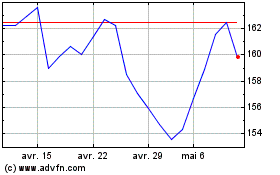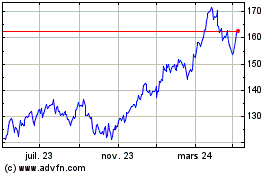Boeing Expects Pandemic to Put Big Dent in Jet Demand
06 Octobre 2020 - 9:24PM
Dow Jones News
By Doug Cameron
Boeing Co. said the coronavirus pandemic will reduce global
jetliner demand by around 2,000 planes over the next decade as
people around the world remain wary of air travel.
The company said in its annual market forecast on Tuesday that
the coronavirus pandemic would likely curb the global aerospace
industry's sales by $200 billion through 2029. That figure is
equivalent to less than two years' worth of combined Boeing and
Airbus SE aircraft deliveries at pre-pandemic levels.
The forecast is the first from a major aircraft maker since the
pandemic drove a slump in airline travel that halved passenger
traffic, triggering thousands of job cuts and upending a decadelong
surge in jetliner demand. The International Air Transport
Association, a trade group, said Tuesday that global airlines are
burning through $13 billion in cash a month.
Boeing shares were down about 3% to $165.70 in midafternoon
trading Tuesday.
Boeing trimmed the value of aircraft and aviation services to
$8.5 trillion over the next decade as it cut the number of expected
aircraft deliveries in its annual 20-year forecast for the first
time since the global financial crisis a decade ago, reducing its
outlook for annual global traffic growth to 4%.
Boeing and Airbus have cut production rates sharply as the
pandemic left airlines and leasing companies unable or unwilling to
accept many of the new planes ordered in recent years.
The U.S. company forecast demand for 18,350 aircraft through the
end of 2029, down 11% from its estimate a year ago as airlines
focus on replacing older planes and pare back expansion into new
markets. Boeing expects demand for over 44,000 planes through 2039,
down 5% from its prior forecast.
The pandemic-driven shock has led airlines to retire hundreds of
older jets earlier than planned, which Boeing said would lead to a
bigger share of new deliveries in the next few years for replacing
them rather than growing the business.
The pandemic has hit demand for long-haul jets particularly hard
as a patchwork of government restrictions and quarantines have left
international air travel volume down 90% from a year ago.
Boeing expects an eventual recovery in the business-class travel
that is crucial to airline profitability, which had all but
disappeared as companies kept employees at home and quarantines
made short trips impractical.
"We do see business travel recovering, even in the long-haul
market," Darren Hulst, Boeing's vice president for commercial
marketing, told reporters.
Some industry leaders such as Delta Air Lines Inc. Chief
Executive Ed Bastian have said they don't expect business travel to
ever return to pre-pandemic levels.
Boeing also doesn't expect airlines to reverse the trend of
adding more seats to aircraft to boost revenue, even as the
pandemic drove some carriers to block seats to promote social
distancing.
"We don't see a change in seating density as a result of the
virus," said Mr. Hulst.
Boeing expects global economic growth to return the airline
industry to expansion mode in the 2030s, albeit at a slower pace
than the boom that led airlines to amass orders for more than
13,000 jets.
The latter half of the 20-year forecast period assumes plane
makers introduce new jet models, which typically spur sales, said
Mr. Hulst. Boeing and Airbus haven't announced any new planes,
though analysts expect both will have to replace their bestselling
single-aisle jets, partly in response to tougher environmental
regulations.
Airbus, which reclaimed its position from Boeing as the world's
largest jetliner maker last year, said it had no immediate plans to
provide a new forecast, given widespread uncertainty over the
airline industry's recovery.
Write to Doug Cameron at doug.cameron@wsj.com
(END) Dow Jones Newswires
October 06, 2020 15:09 ET (19:09 GMT)
Copyright (c) 2020 Dow Jones & Company, Inc.
Airbus (EU:AIR)
Graphique Historique de l'Action
De Mar 2024 à Avr 2024

Airbus (EU:AIR)
Graphique Historique de l'Action
De Avr 2023 à Avr 2024
